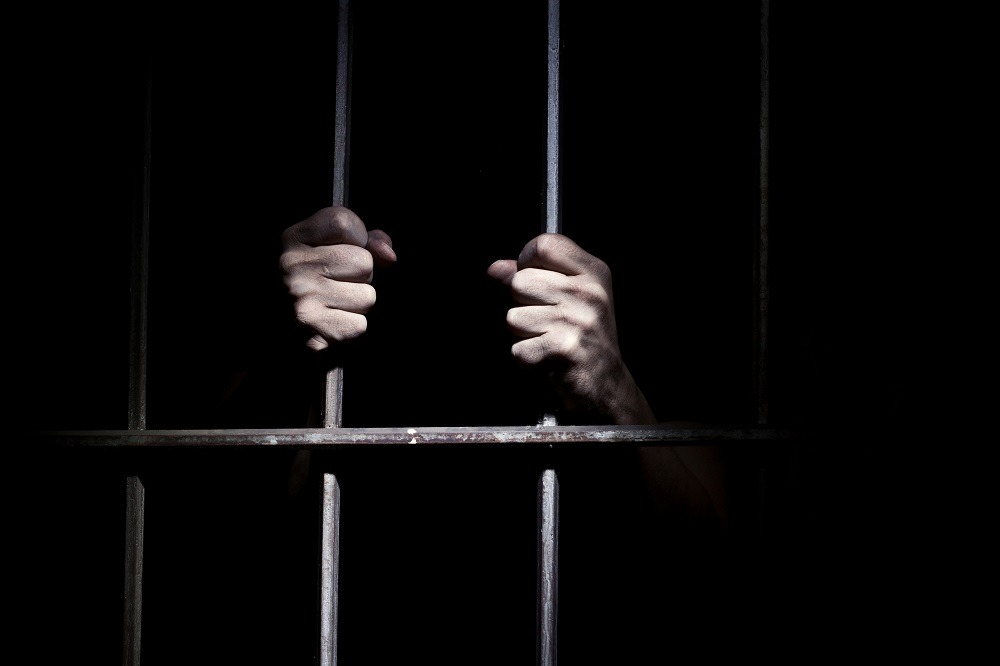NGO lambasts incarceration of new ‘political prisoners’ in Papua

Illustration of a prisoner holding jail bars. (BortN66 / Shutterstock.com)
This article was originally published in The Jakarta Post's print edition on July 14, 2018, with the title "NGO lambasts incarceration of new ‘political prisoners’ in Papua".
Marguerite Afra Sapiie
The Jakarta Post
Jakarta / Sat, July 14 2018]
A non-government organization (NGO) has criticized the imprisonment of what it calls 11 new political prisoners in Papua over the past five months, while President Joko “Jokowi” Widodo’s infrastructure drive continues with the aim of building trust among disgruntled Papuans.
This number adds to 38 Papuan political prisoners currently jailed or imprisoned, mostly because of involvement with separatist movements, according to a report recently received by The Jakarta Post from the Papuans Behind Bars initiative.
Papuans Behind Bars is a data project managed by United Kingdom-based NGO Tapol, which is concerned about human rights in Indonesia. It records data on political arrests in West Papua, “as soon as we receive information about them”.
When asked about the new data, Presidential Office expert on politics, law, defense, security and human rights Sylvana Apituley said the office had not heard about the issue. “We will look into it,” she said.
Ever since the 1969 United Nations-led referendum, which allowed citizens to choose whether they would join Indonesia, known as the “act of free choice”, Papua has been a hotbed of separatist movements. Many have argued that the referendum did not represent all Papuans.
Until today, government efforts have done little to alleviate dissatisfaction among Papuans, many of whom accuse Jakarta of being unfair to them. Some have demanded a referendum to decide whether Papua and West Papua should remain part of Indonesia. Security personnel often labels the activists separatists.
Amnesty International recently released a report on the “unlawful killing” of at least 95 people in Papua, 85 of whom were native Papuans who had been killed by security personnel from 2010 to 2018. It is reported that most of the perpetrators have never been tried.
Most of the political prisoners in the nation have been convicted of treason stipulated under articles 106 and 110 of the Criminal Code in cases human rights activists describe only as exercising their freedom and pro-independence sentiment nonviolently.
“As long as [the activists] don’t commit bombings, arson or violence that harms people, they only stage normal political activities, and it should be seen that way,” Jakarta-based human rights researcher Andreas Harsono told the Post recently.
Jokowi granted clemency in 2015 to five political prisoners in Papua, all of whom had been incarcerated and convicted of breaking into a military depot in Wamena in 2003. At the time, the President said the release was just the beginning, as more political prisoners in other regions would be granted clemency or amnesty. Law and Human Rights Minister Yasonna Laoly said clemency might also be given to those involved in the South Maluku Republic (RMS) separatist movement.
Jokowi sent a letter to the House of Representatives in May 2015, requesting the legislature’s consideration and approval to grant amnesty or absolution to dozens of political prisoners in Papua.
However, Andreas said the House had yet to reply to Jokowi’s letter, which was why efforts to release the prisoners had stalled.
When asked for confirmation, a member of House Commission I overseeing defense, Maj. Gen (ret) Supiadin Aries Saputra, said he did not know about the letter, but the discussion over the criteria of political prisoners was still stalled between the lawmakers and the government since 2015.
The lawmakers wanted to make sure that the prisoners were not convicted of violent crimes, because that could set a bad precedence if the ones who were granted amnesty were “criminals”, Supiadin said.
“There has been no conclusion, and therefore the House has yet to approve. The matter is also yet to be brought to a plenary meeting,” Supiadin told the Post.
Besides Papua, as of 2015, there are at least 29 political prisoners who were convicted of being involved with the RMS movement. They were incarcerated in prisons across the nations, including in Nusakambangan (Central Java), Porong (East Java) and Ambon in Maluku.
Fredy Akihari, a political prisoner from Maluku, recently died from a heart attack in a hospital near his prison in Porong.
He was one of dozens of activists convicted for treason after they had performed a dance and unfurled the banned RMS flag at an event in Ambon in 2007, during which former president Susilo Bambang Yudhoyono sat among the audience with his foreign guests.
Andreas said Jokowi had promised to release Fredy and other activists in 2015 and Yasonna also promised to move them to prison in Ambon, so that they could be closer to their families, but nothing has happened since then.
